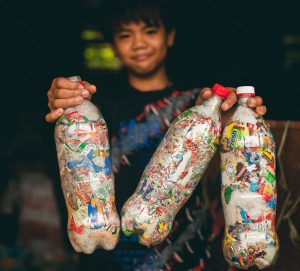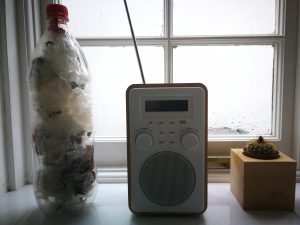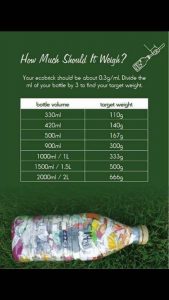Would you ever consider living in a house made of plastic? It would look almost exactly the same as the house you’re living in now, the walls would still be painted, the floor still carpeted, the furniture would still be there and, trust me, you won’t freeze.
It sounds like a strange concept but by stuffing a plastic bottle with unrecyclable and flexible plastic, we are able to create bottles that are so dense and strong that they can be used as bricks. Currently, they have been popularly nicknamed ‘EcoBricks’ and have been sweeping their way down to Cornwall. Environmental groups such as Plastic Free Falmouth and Surfers Against Sewage have promoted and encouraged people to take part in this plastic saving activity.
To make an EcoBrick you first start with a clean, empty plastic bottle. Put it to one side and when you come across plastic you’re unable to recycle (think crisp packets, vegetable bags, yogurt lids) clean it, wait for it to dry and then stuff it inside the bottle. Don’t forget to grab a stick though! The plastic needs to be pushed as far as it can go, everything needs to be packed in tight, so the bottles are dense enough to be used as bricks.
Tip: If you think you’ve finished an EcoBrick, give it a squeeze. If it makes a noise or can be pushed, then you might be able to squeeze in a little more plastic.
While you won’t see houses in Falmouth made out of EcoBricks anytime soon, they can be used on a smaller scale. EcoBricks can be used to create anything from benches to greenhouses to raised gardens and allotments. There currently isn’t one available in the Falmouth area, but, if you have no use for EcoBricks but still want to take part in making one, collection points throughout the UK happily accept EcoBricks and are able to pass them on and use them for community projects.
In developing countries, however, making homes and building out of plastic bottles has been a practice for years. It’s a cheap solution to both a housing crisis and litter crises that many countries throughout the world suffer from. In Bocas, Robert Bezeau noticed how the cleanliness of the town and beaches was disastrous and started a recycling programme in 2012 to make a change.
As a result of the programme, he collected over a million plastic bottles, saving them from being incinerated or sent to landfill sites and decided to use them to create a plastic bottle village. While he does not stuff the plastic bottles as we do here, he does use mesh casing to pack the bottles together and cement to ensure the houses he builds are structurally sound.
Kirstie de La Mer, leader of the Plastic Free Falmouth group is a massive supporter of EcoBricks and is currently in the process of making and collecting them to build a raised platform in her garden. While discussing EcoBricks, she expressed why it is important for people to take part in these sort of projects that are able to find a use for single-use plastic.
“It’s important to do because ultimately it’s really terrible for the environment, it’s really terrible and there’s nowhere for it to go.” She said, “It just breaks down to pieces forever more and becomes intrinsically apart of the soil we use to grow food, it becomes a part of the marine environment where we eat the fish.
“It would be really naïve to think that it’s not a problem that affects everybody because it does, it affects everybody, so it’s really important for everybody to do just one small bit.
“Nobody’s asking everyone to band plastic from their homes in their entirety but everyone to do their little bit and by everyone doing their little bit you make a big change.”
Plastic Free Falmouth has led the way to reduce plastic in Falmouth. Promoting EcoBricks is just one way Kirstie de La Mer is determined to make sure people take part in living a plastic-free life.
While unable to give too much information, she is currently working with the council on a way for people throughout Falmouth to use the EcoBricks they create for a Community Project.
“Then everyone can see their waste has been turned into something positive and productive for the community.” Kirstie de La Mer said, “You’re able to see the full circle of how the system works.
“So you get to say, ‘Well I’ve got the plastic, I’ve made the brick in my house, oh look it’s become part of that and isn’t that amazing because that then benefits the community in this way.’”
Such a small change in our lives can see a massive environmental change worldwide. While EcoBricks are not a permanent solution they are a great temporary fix for the plastic we just can’t seem to escape.



